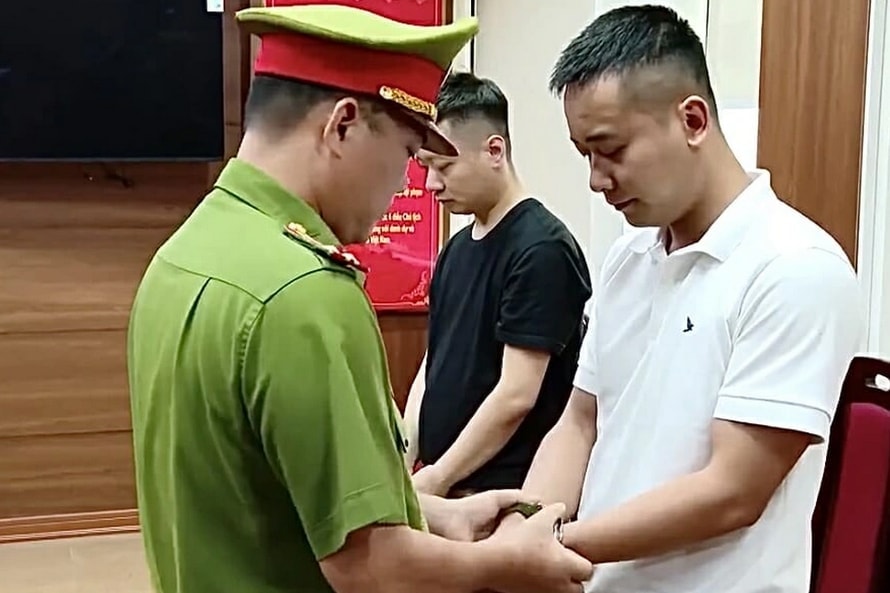This is not the first time a 'celebrity' has been caught up in legal trouble. But the nature of this case involving Quang Linh Vlogs and Hang Du Muc is especially serious.

They were once praised as “global citizens”, bringing a positive image of Vietnamese people to the world. Therefore, the event of Quang Linh Vlogs and Hang Du Muc being arrested for producing counterfeit goods created a big shock to the online community. Behind the cover of charity clips, romantic nomadic life is a series of actions that show signs of organized crime.
Celebrities commit crimes
From a criminological perspective, it is possible to identify some prominent characteristics in the criminal behavior of celebrities – specifically KOLs, YouTubers or TikTokers.
First, they have a “personal brand” – a form of social trust that most consumers place their trust in without verification. This trust, when betrayed, leaves deep wounds not only for the individual but also for the community.
Second, the crimes of celebrities are often disguised under the guise of morality and humanity. They do not commit crimes in a reckless or brutal manner, but often calculate carefully, using their personal image as a moral shield to hide their profiteering behavior behind it.
Third, they possess the ability to manipulate public opinion. When discovered, many cases even use social media as a tool to distract, deny responsibility or create feelings of pity to avoid the law.
No one expected that, just a few months after the charity videos in Africa, the image of Quang Linh Vlogs – the person considered as a “goodwill ambassador” – would appear in a completely opposite context: arrested for producing and trading counterfeit goods. Fans were shocked. The online community was divided.
This is not the first time celebrities have been caught up in the law. But the nature of this case is particularly serious because the individuals who violated the law were once considered “inspirational role models”. They have a huge following and have a profound influence, especially among young people. Taking advantage of their reputation to sell products of unknown origin, even with signs of counterfeiting, raises the level of danger much higher than in ordinary counterfeiting cases.
Why?

Criminal acts are never random. In this case, the defendants' motives may have come from a mixture of three factors: financial pressure - the hope of fame - legal laxity.
Once at the “peak of traffic”, KOLs face pressure to maintain the heat. They are forced to continuously produce content, maintain interactions, and create “best-selling” products to maintain their position. Along with that comes increasing financial demands. In an environment where speed is valued over quality, many have chosen the short cut: taking advantage of their reputation to sell uncontrolled goods, even counterfeit goods.
Along with that, loopholes in monitoring commercial and advertising activities on digital platforms have facilitated violations. Currently, many products promoted or directly produced by KOLs are completely unlicensed and untested for quality, but are still brazenly released to the market with beautiful promises.
Broken trust
A case may affect a few individuals, but a case involving a celebrity will affect millions of followers. Young people - who are loyal fans - are easily disoriented, skeptical, and even apathetic after such incidents.
The fall of idols not only erodes trust, but also inadvertently spreads a distorted view: that morality is just a tool for image business, that halo can be created by script, and that law violations can be "dealt with later".
The long-term effect is a breakdown of social norms. People begin to doubt even genuinely decent individuals. The distrust spreads, leading to defensiveness, isolation, and a loss of trust in the community.
Do not encourage or support
There is no denying the positive aspects of social media in spreading information and monitoring society. However, in many cases, social media itself has become a fertile ground for “virtual idols” to manipulate the public. They intentionally build their image, create “humane content” to attract trust – thereby offering poor quality products or services that are still well received.
The censorship mechanisms of the platforms are still inadequate. While small retailers must register their businesses and declare the origin of their products, many KOLs are “favored” by the algorithm - as long as they attract interactions.
The question is: who controls the promotional content of KOLs? Who is responsible when they make mistakes? And how long will it take for us to have a clear legal framework for the creative economy in the digital environment?
The Quang Linh Vlogs and Hang Du Muc cases are not only a warning to those who want to “upgrade” through social networks, but also a wake-up call to those who make the State’s management policies in the digital age. When reputation is used as a tool for profit, when social trust is abused and exploited, when the halo becomes something to hide corruption, the law must be the clearest line.
Keeping cyberspace clean is not only the responsibility of the authorities, but also the responsibility of every user - every young person - and every influential person.
Lieutenant Colonel, Doctor DAO TRUNG HIEU, criminology expert